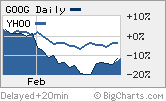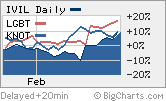|
It's a small (online) world after all
While investors worry about Google and Yahoo!, niche online firms like PlanetOut and iVillage are basking in Wall Street's glow.
NEW YORK (CNNMoney.com) - Investors have grown wary of the Internet colossuses. Shares of Google (Research) and Yahoo! (Research) both slumped after the companies reported healthy earnings and revenue gains that were viewed as disappointments because they failed to meet lofty expectations.
Since their last earnings reports, Google's stock is down 13 percent while Yahoo!'s has plunged 17 percent. But Wall Street has latched on to smaller Web firms that cater to specific niches. Shares of technology news site CNET Networks (Research) are up more than 4 percent since reporting its fourth-quarter results earlier this month. Online wedding information company The Knot (Research) has gained 10 percent following its fourth-quarter report. The stock price of PlanetOut (Research), which runs several sites geared to gay and lesbian audiences, has gained 16 percent since its latest results were released last week. And shares of iVillage (Research), which owns sites focused on women, have shot up 21.5 percent in the wake of the company's fourth-quarter numbers. "Wall Street is looking for small players on the Internet who are focused on a particular consumer segment," said James Lee, an analyst with America's Growth Capital who covers The Knot and Stamps.com (Research). "A dominant niche site can generate repeat visits from customers that are loyal to the site." Niches are attractive to advertisers...
This trend – the emergence of smaller specialty sites – is expected to continue this year. In other words, there's a lot more to the Web than Google and Yahoo! Consumers have plenty of options beyond the search leaders. "There are more choices for consumers. You see what's happening in the broadcast area. TV is becoming more fragmented and I do believe that will happen on the Web with more niche type sites and community type sites," said Patrick Vogt, chief executive officer of Viewpoint (Research), an Internet marketing technology firm. Vogt argues that sites like CNET and iVillage, which have specific targeted audiences, also can charge more premium rates for ads since the advertiser knows exactly who they are reaching when they buy an ad on these types of sites. "Niche sites are providing a richer experience so they can charge more. They have a relevant market for advertisers," he said. Along those lines, Jeff Lanctot, general manager with Avenue A|Razorfish, an ad agency owned by online marketing firm aQuantive (Research), said his company spent $418 million on behalf of clients last year and that 35 percent of that went to so-called "verticals," sites catering to specific interests like health, entertainment, news and travel. That's the largest category that Avenue A|Razorfish spent on. By way of comparison, 31 percent of the company's online ad buys were for search results and just 13 percent were for portals such as Yahoo!, AOL and MSN. (AOL is owned by Time Warner (Research), which also owns CNNMoney.com.) Lanctot said that as the Internet continues to mature, larger advertisers are showing a greater tendency to spend on ads targeted to specific sites as opposed to sponsoring search results. "Big brand advertisers are not as likely to spend as much on search," he said. "Niche sites are getting quite a bit of money." ...and perhaps other media companies
This hasn't gone unnoticed by larger media companies either. Several smaller Internet sites were scooped up last year and analysts expect News Corp (Research), which bought MySpace last year, Barry Diller's IAC/InterActive (Research) and John Malone's Liberty Media (Research) to make some more deals this year. To that end, iVillage is rumored to be up for sale and in the process of accepting takeover bids. And Lee said that a company like The Knot could be attractive to Yahoo! or a magazine publisher like Conde Nast, which owns "Bride's," "Elegant Bride" and "Modern Bride." But investors need to be cautious. Wall Street has proven to be extremely fickle when it comes to the Internet sector. Google, after all, reported fourth quarter earnings that grew more than 80 percent and sales that doubled and that wasn't enough to satisfy investors. And like their larger brethren, the niche online players all have rich stock prices. PlanetOut, trading at 34 times 2006 earnings estimates, is among the "cheapest" of the smaller online content companies. Still, smaller online firms are also expected to grow pretty rapidly, just like Google and Yahoo! For a look at why Google has been on the defensive lately, click here. Will News Corp. out-Fox competitors online? Click here. America's Growth Capital's Lee does not own shares of the companies mentioned and his firm has no banking relationships with the companies.
The reporter of this story owns shares of Time Warner through his company's 401(k) plan. |
| ||||||||||||||||||||||||||||||||||||||||||||||||||||||||||||||||




